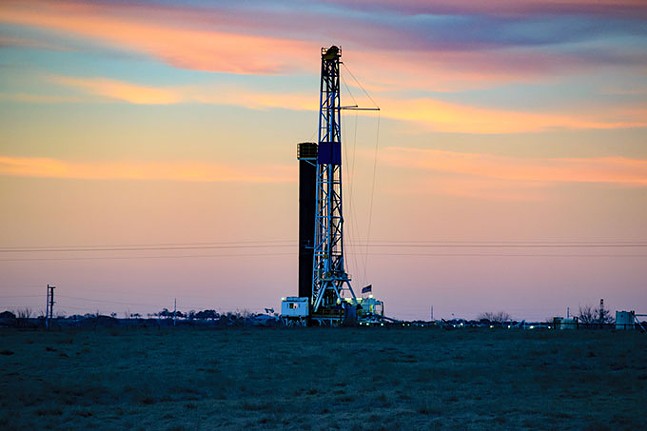Study shows rural Pennsylvania school districts not benefiting from nearby fracking
Natural-gas industry boosters make several arguments for why natural-gas drilling, aka fracking, is beneficial for Pennsylvania. But their main argument, and one that is often repeated by Republican and many Democratic politicians, is economic. Industry boosters claim the economic growth and jobs, especially in rural areas, that come with the growth in the fracking industry is too good to pass up, even if health and environmental problems follow.
But a new study from Penn State University is shedding light on some of those claims, with a focus rural school districts where fracking is occurring, and it's not positive.
Titled “A ‘Resource Curse’ for Education?: Deepening Educational Disparities in Pennsylvania’s Shale Gas Boomtowns,” authors and Penn State education department professors Matthew Gardner Kelly and Kai A. Schafft dig into the school district revenues in areas that were home to drilling rigs in between 2007-2015.
“Evidence from our analysis suggests that, on average, districts experiencing unconventional drilling had lower per-pupil revenues, locally raised per-pupil funding for schools, per-pupil income, and per-public property wealth than very similar districts that did not experience unconventional drilling," reads the study.
Of the 167 rural school districts in Pennsylvania, 94 contain fracking wells. About a third of Pennsylvania’s school districts are rural, yet about 56% of the fracking wells are in those rural districts. Some of those school districts with a prevalence of fracking wells, like Canon-McMillan School District, are experiencing a spat of rare cancers.
Fracking also has been linked to a myriad of health issues, like asthma, fatigue, high-risk pregnancies, migraines, and skin disorders. Wells can leak copious amounts of methane, a powerful greenhouse gas, into the atmosphere.
The authors write that this result seems counterintuitive since Pennsylvania provides a low share of state funding to school districts compared to other states, and relies more heavily on local funding from property taxes. According to the Pittsburgh Post-Gazette, the Pennsylvania School Boards Association calculated that almost 58% of school-district revenues came from local taxes and 38% came from the state, for the 2017-18 school year. Conventional wisdom would mean that fracking should boost the local economy more, resulting in higher property rates for those rural communities, and local funding would increase to those school districts. But the opposite is happening.
According to the study, Pennsylvania school districts that experienced natural-gas drilling had $1,550 less per pupil in 2015 dollars, relative to otherwise similar districts that did not have fracking. The study also weighted the results for factors known to impact the resource needs of district, including the percentage of low-income students, enrollment size, and property values and income per pupil.
“In other words, we estimate that districts experiencing unconventional drilling had lower incomes and property wealth per pupil that we would expect them to have had if they had not experienced unconventional drilling,” reads the study.
The study found a modest increase in the amount of federal and state revenue with fracking, but the authors say the increase was not enough to offset the average negative effects. In an op-ed published by the Philadelphia Inquirer, the authors explain that this was because the state only institutes a one-time impact fee that collects revenue when a well is drilled, as opposed to a “severance tax that collects revenue based on the amount of the energy resource produced.”
The authors write that “since 2007, more than 10,000 unconventional gas wells have been drilled in Pennsylvania, mostly in the northern and southwestern parts of the state, with peak drilling occurring between 2010 and 2014.” Urban school districts in Pennsylvania account for less than 1% of fracking wells, while suburban school districts accounted for 10% of wells. The rest, about 40%, occur in school districts classified as towns.
In Pennsylvania, like most states, the wealthiest school districts tend to be in the suburbs. In the Pittsburgh area, the five wealthiest school districts all sit near the border of Allegheny County (Upper St. Clair, Peters Township, Pine-Richland, North Allegheny, and Mars Are), according to the Pittsburgh Business Times. Most fracking wells currently sit in Washington County, with large numbers in Butler and Westmoreland counties as well.
The study could suggest a phenomenon where fracking is actually contributing to a wealth transfer from rural to suburban school districts, possibly because those earning wealth in the fracking industry aren’t living in the rural communities that are experiencing the majority of the drilling.
“Despite promises that unconventional gas production would be an engine of economic opportunity, many Pennsylvania school districts continue to struggle financially, a struggle that appears to be worsened by gas development,” wrote Kelly and Schafft in a story for The Conversation.
But a new study from Penn State University is shedding light on some of those claims, with a focus rural school districts where fracking is occurring, and it's not positive.
Titled “A ‘Resource Curse’ for Education?: Deepening Educational Disparities in Pennsylvania’s Shale Gas Boomtowns,” authors and Penn State education department professors Matthew Gardner Kelly and Kai A. Schafft dig into the school district revenues in areas that were home to drilling rigs in between 2007-2015.
“Evidence from our analysis suggests that, on average, districts experiencing unconventional drilling had lower per-pupil revenues, locally raised per-pupil funding for schools, per-pupil income, and per-public property wealth than very similar districts that did not experience unconventional drilling," reads the study.
Of the 167 rural school districts in Pennsylvania, 94 contain fracking wells. About a third of Pennsylvania’s school districts are rural, yet about 56% of the fracking wells are in those rural districts. Some of those school districts with a prevalence of fracking wells, like Canon-McMillan School District, are experiencing a spat of rare cancers.
Fracking also has been linked to a myriad of health issues, like asthma, fatigue, high-risk pregnancies, migraines, and skin disorders. Wells can leak copious amounts of methane, a powerful greenhouse gas, into the atmosphere.
The authors write that this result seems counterintuitive since Pennsylvania provides a low share of state funding to school districts compared to other states, and relies more heavily on local funding from property taxes. According to the Pittsburgh Post-Gazette, the Pennsylvania School Boards Association calculated that almost 58% of school-district revenues came from local taxes and 38% came from the state, for the 2017-18 school year. Conventional wisdom would mean that fracking should boost the local economy more, resulting in higher property rates for those rural communities, and local funding would increase to those school districts. But the opposite is happening.
According to the study, Pennsylvania school districts that experienced natural-gas drilling had $1,550 less per pupil in 2015 dollars, relative to otherwise similar districts that did not have fracking. The study also weighted the results for factors known to impact the resource needs of district, including the percentage of low-income students, enrollment size, and property values and income per pupil.
“In other words, we estimate that districts experiencing unconventional drilling had lower incomes and property wealth per pupil that we would expect them to have had if they had not experienced unconventional drilling,” reads the study.
The study found a modest increase in the amount of federal and state revenue with fracking, but the authors say the increase was not enough to offset the average negative effects. In an op-ed published by the Philadelphia Inquirer, the authors explain that this was because the state only institutes a one-time impact fee that collects revenue when a well is drilled, as opposed to a “severance tax that collects revenue based on the amount of the energy resource produced.”
The authors write that “since 2007, more than 10,000 unconventional gas wells have been drilled in Pennsylvania, mostly in the northern and southwestern parts of the state, with peak drilling occurring between 2010 and 2014.” Urban school districts in Pennsylvania account for less than 1% of fracking wells, while suburban school districts accounted for 10% of wells. The rest, about 40%, occur in school districts classified as towns.
In Pennsylvania, like most states, the wealthiest school districts tend to be in the suburbs. In the Pittsburgh area, the five wealthiest school districts all sit near the border of Allegheny County (Upper St. Clair, Peters Township, Pine-Richland, North Allegheny, and Mars Are), according to the Pittsburgh Business Times. Most fracking wells currently sit in Washington County, with large numbers in Butler and Westmoreland counties as well.
The study could suggest a phenomenon where fracking is actually contributing to a wealth transfer from rural to suburban school districts, possibly because those earning wealth in the fracking industry aren’t living in the rural communities that are experiencing the majority of the drilling.
“Despite promises that unconventional gas production would be an engine of economic opportunity, many Pennsylvania school districts continue to struggle financially, a struggle that appears to be worsened by gas development,” wrote Kelly and Schafft in a story for The Conversation.

















